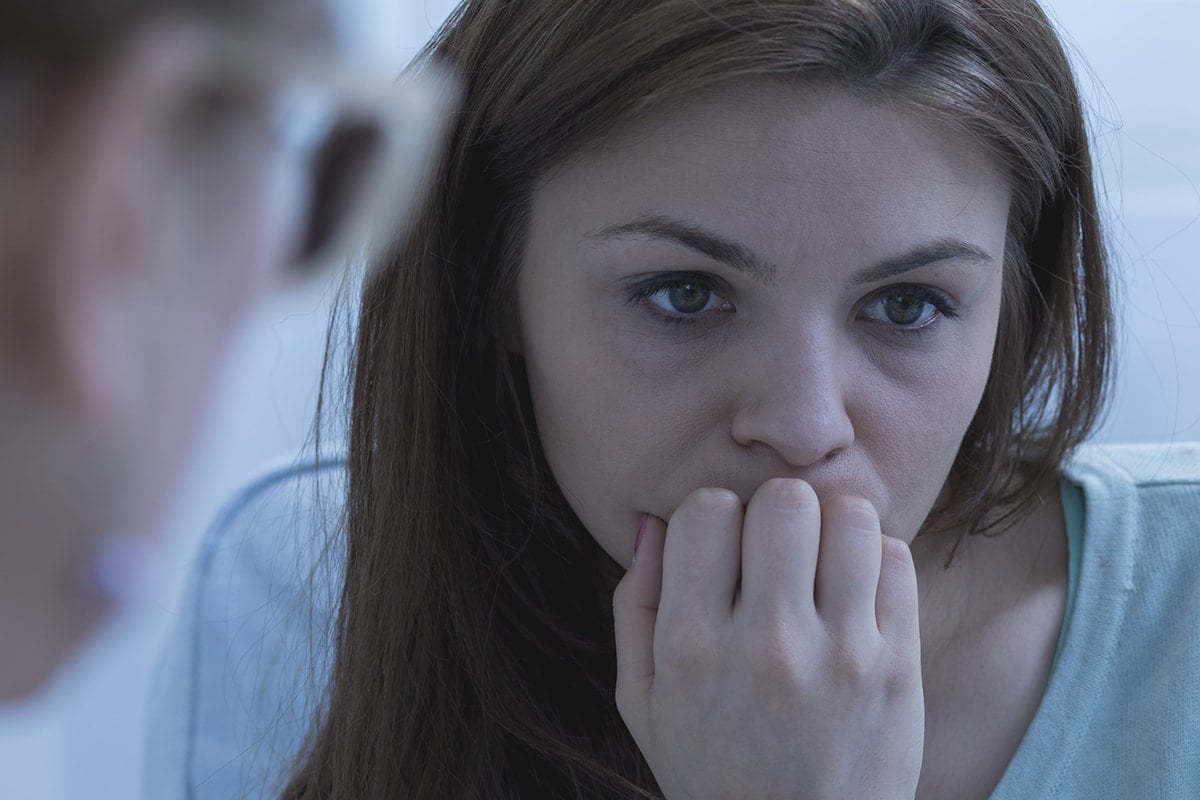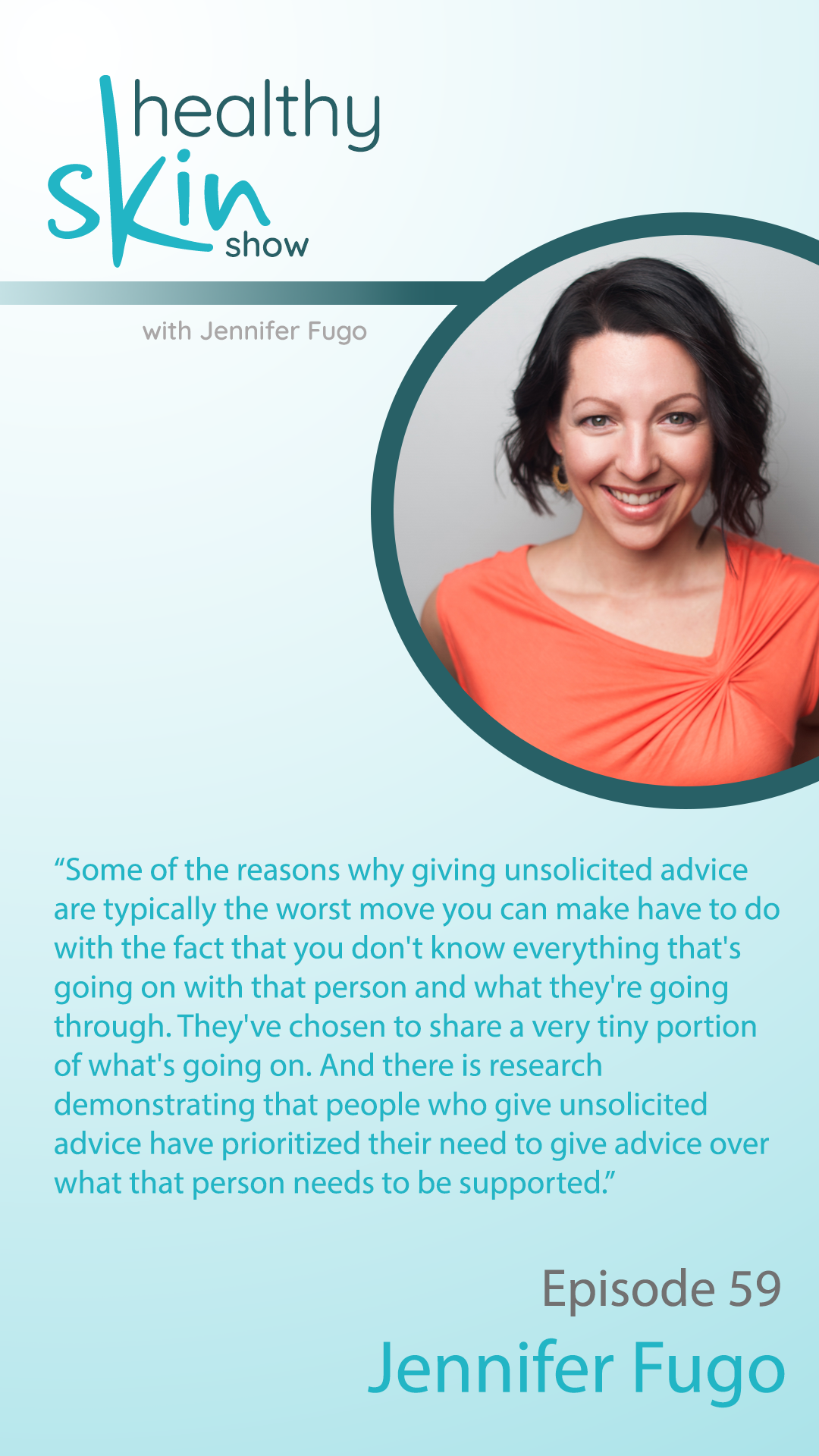
If you’ve ever been vulnerable enough to share some pretty embarrassing details of what’s going on with your skin, you’ve probably gotten a lot of comments and advice that you really didn’t ask for.
Especially when some people have very firm (ahem… pushy) beliefs that dictate that there’s just ONE WAY to solve your problem.
I’ll bet you may have regretted sharing.
Living with chronic skin rashes can be a very isolating experience. When you can’t safely share where you are without the onslaught of what is known as unsolicited advice, it can make you think twice about ever sharing again.
Today I’m breaking down how to avoid constantly giving unsolicited advice and how to better support people in the chronic skin rash community (and in your life).
Or, listen on your favorite app: iTunes (Apple Podcasts) | Spotify | Stitcher | TuneIn | Subscribe on Android
In this episode:
- What is unsolicited advice?
- Why unsolicited advice is incredibly unhelpful and unsupportive no matter how good your intentions are
- How to respond to someone sharing their story that’s more supportive
- The one phrase you must never use when responding to someone’s vulnerable health share
Quotes:
Some of the reasons why giving unsolicited advice are typically the worst move you can make have to do with the fact that you don't know everything that's going on with that person and what they're going through. They've chosen to share a very tiny portion of what's going on. And there is research demonstrating that people who give unsolicited advice have prioritized their need to give advice over what that person needs to be supported.
Support is not the same thing as giving advice. Advice is welcome only when it is explicitly asked for or if you get permission to share. Every share that comes across your feed is not necessarily an invitation for advice. Oftentimes people just want to feel heard without you or anyone else offering a solution.
Further Reading
Why Unsolicited Advice Can Ruin Relationships (https://www.psychologytoday.com/us/blog/moments-matter/201608/why-unsolicited-advice-can-ruin-relationships)
Why People Give Unsolicited Advice (Though No One Listens) (https://www.psychologytoday.com/us/blog/insight-is-2020/201712/why-people-give-unsolicited-advice-though-no-one-listens)
What To Do About That Person Who Won’t Stop Giving You Unsolicited Advice

Stop Giving Unsolicited Advice (And How To Better Support People With Skin Rashes) (FULL TRANSCRIPT)
Welcome back to episode #59 of the Healthy Skin Show!
In today's episode, I'd like to talk about a really common and often unhelpful tendency that many of us have fallen victim to…
Giving and being on the receiving end of unsolicited advice.
I'm willing to bet that at some point you've been in a Facebook group or somewhere online having shared your story about what's going on with the intention of informing people about why maybe you've been so MIA. Or inspiring people.
And you'll find that something strange happens.
Everyone starts to give their opinion about what you should do. Before you know it, 300 comments later, you are knee-deep in a gazillion suggestions that everyone swears will help you and they all happen to be different.
Some people will even be so pushy. I hate to use that word, but sometimes people are pushy insisting that their way is the only way and every other way is completely wrong and asinine. And you shouldn't do this and you should only do that.
You begin to feel like the decision to share what you shared might not have been such a great idea.

What Is Unsolicited Advice?
I unfortunately see this a lot in Facebook groups, especially for those that have to do with skin issues as well as Instagram posts where someone is sharing where they are on their journey. Often just hoping to let others know that they're not alone and to update people about what's going on.
It's even happened to me many times and I've seen it happen to colleagues and friends across the board where all of a sudden that share seems to be an open invitation to tell the other person what to do.
That advice that you're giving without that permission and those other people who are giving it to you is considered unsolicited… also known as unwanted advice.
Now I understand that the intention is always to be helpful.
You want to help them find answers and connect them with answers that they might not have thought of yet or maybe their doctor didn't tell them.
But here's the thing, junk mail and telemarketing calls are also technically unsolicited advice on a problem that you may or may not have. I’m willing to bet that you don't particularly like those either.
You didn't ask for that help and yet you have these companies or these individuals telling you what you should do. Think about how telemarketers make you feel.
Yet we are willing to go out of our way, because our intentions are good, to give people opinions that they don't necessarily want nor need at that point in their journey.
In many instances, sharing without specifically being asked for ideas or suggestions can actually be unhelpful. And it can even be detrimental to your relationship with that particular individual.
Some of the reasons why giving unsolicited advice are typically the worst move you can make have to do with the fact that you actually don't know everything that's going on with that person and what they're going through.
They're only choosing to share a very tiny portion of what's actually going on.
They may have also tried what you're suggesting and it did not work for them.
There is also been some research that demonstrates that people who tend to give unsolicited advice as almost like a knee jerk reaction have prioritized their need to give advice over what that person who's in need actually needs to be supported.

How Exactly Do You Support Someone Sharing Their Health Issues With You?
And so here's one piece to this that I think is incredibly important and highly underrated…
Support is not the same thing as giving advice. Advice is welcome only when it is explicitly asked for or if you get permission to share.
And furthermore, every share that comes across your feed or from someone you’re speaking with is not necessarily an invitation for advice.
Oftentimes people just want to feel heard without you or anyone else offering a solution.
So let's talk a little bit about what support actually looks like especially if it's not giving someone advice that they may not have actually asked for!
Here are some statements that would be more in line with supporting someone rather than giving unsolicited advice:
“Wow. Thank you for sharing that. I had no idea any of this was going on. Is there something that I can do to support you?”
“I can imagine that this has been really difficult for you and it was hard for you to share this. I'm going to keep you in my thoughts and prayers. Keep us posted on how things go and how we can help.”
“Sending you lots of love! You've got this!”
“I've been through this too and I know how hard this can be. Let me know how I can support you.”
Or if you do want to share, but you're asking for that permission…
“This really hits home. I've been through this too, and if you ever want any suggestions about things to try, let me know. Happy to share any time.”
Do you see the difference? The statements show support for that person and they acknowledge what that person is going through and where they are.
But in the same respect, they allow the individual who shared to determine whether they want advice and if they want advice from you.

If You Really Want To Help Someone, Do This!
And another thing that you can also do is to check in with that person privately.
Send them a text message or an email or a private message.
Let them know that you're thinking about them and if there's anything that you can do. Let them know that there's always an open door there and you're happy to even just be an ear to listen to them in moments where they really feel frustrated, sad, or they just need a friend.
That shows this person in need that you really do truly care.
And by the way, there is one word that you should avoid using… and I just used it.
It's the word should.
If your suggestion starts with “you should”… delete everything you just wrote and halt yourself mid-sentence.
If it's something that you're verbally saying to another person and say, “you know what? I'm sorry. I can imagine that what you're going through is really hard and I can understand why this is so frustrating or upsetting for you. I'm here for you. How can I help you?”
That is the beginning of a dialogue that offers the other person who is suffering or frustrated or confused or any number of things, a safe space to communicate with you rather than feeling like you're just throwing ideas and solutions at them that they may not be ready to hear.

Not everyone wants a solution when they share.
That's why I felt so compelled to talk about this today because it's one of the things I've noticed in myself — this desire to want to help others.
I have practiced (and it literally is a practice) over the last few years of being a lot more cognizant of how I respond to people when they share what they're going through. I’m there to listen to their stories and much more careful to ask for permission if I do share.
I’ve witnessed the power again and again of allowing that person the space to travel on their own journey at their own pace.
If you have been on the receiving end of getting unsolicited advice that made you feel incredibly overwhelmed and wishing that you had never shared what was going on with you in the first place…
Or if you tend to respond almost in a knee jerk fashion when someone shares an issue with unsolicited advice, I would love to hear from you.

Leave your comments and thoughts below!
This is a great opportunity for us to have a conversation about how we can support one another better. Because support is a critical piece to helping people find their way on their own health journey without hijacking it.
I know this is a very different type of conversation than you are used to hearing me talk about, but it's equally important because we are tending to our community and how we show up and how we support one another really impacts everyone.
It’s so common for people with chronic skin rashes to withdrawal further and further from life. So when someone is reaching out, let’s give them the space to be where they are. Responding to them respecting that space is critical instead of constantly feeling like we need to help them fix it or that we know better.
Of course, if you haven't done so yet, please subscribe to the show and then rate and review the healthy skin show on your podcast platform of choice. Your support goes a long way to helping others who are seeking new ways and new ideas of how to deal with their skin rashes connect with this information that we discuss here on the show.
I am so appreciative that you've tuned into this. I hope that you have a wonderful rest of your day and I'll see you in the next episode!

Jennifer Fugo, MS, CNS
Jennifer Fugo, MS, CNS is an integrative Clinical Nutritionist and the founder of Skinterrupt. She works with women who are fed up with chronic gut and skin rash issues discover the root causes and create a plan to get them back to a fuller, richer life.




